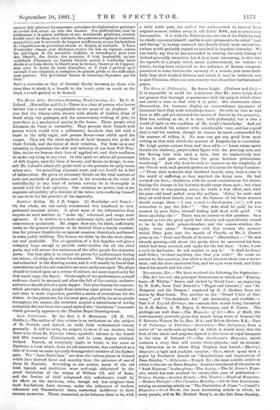The Story of Philosophy. By Aston Leigh. (Triibner and Co.)—
It is impossible to avoid the conviction that Mr. Aston Leigh does not possess that thorough acquaintance with his subject which alone can entitle a man to deal with it in print. His statements about Demoeritus, for instance, display an extraordinary ignorance of historical facts that most schoolboys know. He tells us that he was born in 460, and yet attracted the notice of Xerxes by his precocity. This has nothing to do, it is true, with philosophy, but it lets a world of light on the condition of Mr. Leigh's knowledge. And yet he has studied his subject with considerable care, and has a good deal to tell his readers, though he cannot be mach commended for his manner of telling it. No man can get any good from such writing as that with which the account of Empedocles is concluded. Mr. Leigh quotes certain lines, and then adds :—" Lines whose spirit invests the shadowy, purple-robed figure with the piercing eyes and the flowing hair with such a halo, that we instinctively bow before it, and pass away from the great heathen philosopher, wondering." And why does he seek to improve on the simplicity of the Phaedo with such pseudo-pathos as this about the dying Socrates : —" Those slow moments that throbbed heavily away were a year in the world of suffering, as they watched the dying man. He had covered his face,—doubtless, with his usual consideration for others, fearing the change in his features would cause them pain ; but when he felt that he was passing away, he made a last effort, and, with his poor cold hand pulled away the pallium. Crito,' he said—and they all held their breath, that not the faintest of his faint accents should escape them—' I owe a cock to Esculnpeius ; will you remember to pay the debt " The debt shall be paid,' he was assured by poor Crito, himself feeling half dead with grief. ' Is there anything else ? ' There was no answer to this qnestion. In a moment or two the great spirit had silently and mysteriously ceased to be in the dark prison-chamber, and the sorrow-stricken dis- ciples were alone." Compare with this version the account which Plato puts into the mouth of Phaedo, as Mr. J. Church gives in his " Trial and Death of Socrates " (Macmillan) :—" He was already growing cold about the groin, when he uncovered his face, which had been covered, and spoke for the last time. Critc, I owe
a cock to Asclepius ; do not neglect to pay it.' It shall be done,' said Crito ; is there anything else that you wish ?' Ho made no answer to this question ; but after a short interval there was a move- ment, and the man uncovered him, and his eyes were fixed, and Crito closed his mouth and his eyes."






























 Previous page
Previous page